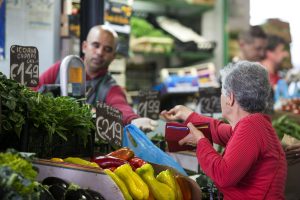الملاحظات التقييمية الرسمية على الحوارات إلى قمة الأمم المتحدة للنظم الغذائية لعام 2021
نوع الحوار
بدعوة من
لغة فعالية الحوار
التاريخ/الوقت
إلى:
المدينة
نطاق التركيز الجغرافي
التنسيق
يُرجى مراجعة التفاصيل أدناه للحصول على معلومات التسجيل إذا كانت متوفرة أو الاتصال بمنظم الحوار إذا كنت ترغب في الحضور.
القيّم
الوصف
A paradigm shift towards sustainable food systems can only be achieved if citizens are enabled and empowered to make healthier and more sustainable food and lifestyle choices. With that backdrop, this dialogue sets to bring diverse EU stakeholders around the table, to break the silos, to address the urgent need to combat all forms of malnutrition and environmental degradation, and at the same time, to empower citizens to adopt healthier and more sustainable behaviors – by increasing trust in science, and by securing aligned, evidence-based communication & policy.
It envisages to connect the often fragmented nutritional and environmental conversations from policy to consumers, to understand positions across stakeholders, to communicate and agree on an aligned vision, proposing accurate & accountable actions that will lead to better policy coherence in the food system, and to a food environment that is inclusive, that benefits all citizens and the planet. This is an ambitious goal, which requires all sectors and all segments of the society to take a solutions-based approach, as often referred to by the UN Special Envoy to the UN Food Systems Summit (UNFSS), Agnes Kalibata.
This Independent Food Systems Dialogue follows on the landmark documents that lead towards a sustainable, future-proof food system, while providing for better health of people and the planet. They include the Farm2Fork strategy of the European Commission, the Guiding Principles for Sustainable Healthy Diets of the FAO and WHO, the SOFI 2020 on transforming food systems for affordable healthy diets, and the dialogue takes place right after the publication of the CFS Voluntary Guidelines on Food Systems and Nutrition .
This Dialogue brings together stakeholders from the fields of science, food chain, policy and civil society, with a special focus on the institutions and the non-state actors operating in Brussels and impacting across Europe – a stakeholder segment that has not been captured by the Food Systems Dialogues thus far. Given the importance of the EU as a global partner for the food system transformation, the outcomes of this dialogue will make for an instrumental contribution to the UNFSS.
الشكر والتقدير


